#Socio-economic challenges
Text
Pakistan Elections: The ‘Militablishment’ May Have Won The Battle, But Is It Losing The War?
“Pakistan’s multiple socio-economic and geographic challenges will only worsen if the country’s powerful military continues to try to control the nation’s decision-making processes”
Ershad Mahmud*
The recent general elections in Pakistan, the results of which are yet to be finalised, gave birth to distinct themes, echoing with clarity and significance. Among these, a resounding message becomes…
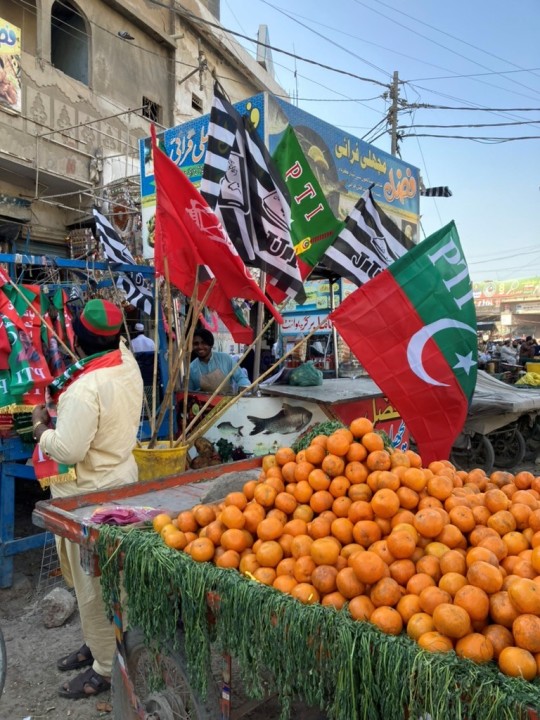
View On WordPress
#Balochistan#Election Day in Pakistan#Geographic challenges#Imran Khan#Khyber Pakhtunwa#Low voting in Pakistan#Military Leadership#MQM#Pakistan General Elections#Pakistan Military Establishment#PML-N#PPP#PTI#Punjab#Sapan News#Shehbaz Sharief#Sindh#Socio-economic challenges
0 notes
Text
Evaluation on the Socio-economic challenges face people during and after a disaster strike.
Climate disasters are increasing in regularity & intensity. This presents many new socio-economic challenges to the people of Sri Lanka.

This International Day for Disaster Risk Reduction, read more on UNDP's efforts as we strive to 'fight inequality for a resilient future'.
#drrday#international day for disaster risk reduction#UNDP#socio-economic challenges#climate disaster#natural hazards#climate resilience
0 notes
Text
Breaking Barriers: The Challenge of Electrification in Remote Areas

In today's rapidly evolving world, the importance of electrification cannot be overstated. Access to electricity is a cornerstone of modern living, enabling progress in education, healthcare, communication, and economic development. Over the past few decades, remarkable strides have been made in electrification efforts, but there remains a significant challenge in reaching the hardest-to-reach areas. This article explores the obstacles hindering impressive progress in electrification and sheds light on the efforts being made to overcome these challenges.
The Significance of Electrification
Electrification is a critical component of building sustainable and inclusive societies. It enhances the quality of life for people in both urban and rural areas, enabling them to access vital services and technologies. Electricity facilitates the functioning of schools, hospitals, industries, and communication networks, empowering communities to thrive and participate in the global economy. However, despite its transformative power, millions of people around the world still lack access to electricity.
The Impressive Progress
In recent years, electrification efforts have achieved remarkable progress. Governments, non-profit organizations, and private companies have collaborated to expand electricity access to remote and underserved regions. The adoption of renewable energy sources, such as solar, wind, and hydro power, has played a significant role in bringing electricity to areas with limited infrastructure. Additionally, advancements in technology and innovative micro-grid systems have made it possible to overcome geographical barriers and provide energy solutions to previously inaccessible locations.
Challenges in Reaching the Hardest-to-Reach
While impressive progress has been made, electrification in remote areas faces formidable challenges. Some of the key obstacles include:
Geographical Barriers: Many remote regions are situated in rugged terrains, such as mountains, forests, or deserts. Building and maintaining traditional power infrastructure in these areas can be prohibitively expensive and logistically challenging.
Lack of Infrastructure: Remote regions often lack basic infrastructure like roads and transportation networks, making it difficult to transport materials and equipment needed for electrification projects.
Affordability: In impoverished regions, the cost of setting up and maintaining electricity infrastructure can be a burden for both the communities and the providers.
Political and Social Instability: In certain areas, political conflicts and social unrest can hinder progress in electrification efforts, discouraging potential investors and disrupt ongoing projects.
Environmental Concerns: Balancing the need for electrification with environmental conservation is crucial. Some remote areas are ecologically sensitive, and care must be taken to ensure sustainable and eco-friendly energy solutions.
Solutions and Initiatives
Despite the challenges, numerous initiatives are actively working to bring electricity to the hardest-to-reach regions. These efforts include:
Off-Grid and Micro-Grid Systems: Off-grid solar systems and micro-grids provide localized and decentralized energy solutions, bypassing the need for extensive infrastructure. They can be tailored to suit the specific energy demands of a community.
Mobile Technology: Mobile technology has become a powerful tool in facilitating electrification. Mobile payment platforms and smart grids help manage energy distribution efficiently.
Public-Private Partnerships: Collaborations between governments, non-governmental organizations, and private companies have proven effective in pooling resources and expertise to tackle electrification challenges.
Miniaturized Technologies: Technological advancements have led to the creation of compact and efficient energy solutions, such as portable solar panels and mini wind turbines, making them suitable for deployment in remote areas.
Community Engagement: Empowering local communities to take ownership of electrification projects fosters a sense of responsibility and sustainability.
Conclusion
Impressive progress in electrification has undoubtedly improved the lives of millions, but there is still much work to be done to reach those hardest-to-reach areas. The challenge of electrifying remote regions requires innovative solutions, collaborative efforts, and a commitment to sustainable development. As technology continues to advance and awareness grows, there is hope that the barriers hindering electrification will gradually crumble, lighting up the lives of those who have remained in the dark for far too long. It is essential for governments, organizations, and individuals to come together and invest in electrification as a means of driving positive change, fostering economic growth, and leaving no one behind in the pursuit of a brighter and sustainable future.
What's In It For Me? (WIIFM)
Are you curious about the state of electrification in remote areas and the challenges hindering its progress? Discover how impressive efforts to bring electricity to the hardest-to-reach regions impact global development, the environment, and the lives of millions. Learn about innovative solutions and initiatives that can transform the future of those in need, while contributing to a sustainable and inclusive world.
Join the Movement: Let's Light Up Lives Together!
Be a part of the electrification revolution! Help us overcome the challenges of reaching remote areas with electricity. Share this article to spread awareness and inspire others to support electrification efforts. Together, we can make a difference and empower communities worldwide. Click here to learn more about how you can get involved and contribute to this meaningful cause.
Blog Excerpt
The quest for electrification in remote and underserved areas has seen impressive strides, yet it faces significant challenges that slow its progress. Access to electricity is pivotal in shaping modern living, but millions of people still lack this essential resource. This article delves into the obstacles hindering electrification, including geographical barriers, lack of infrastructure, and affordability issues. We explore the solutions and initiatives driving change, such as off-grid and micro-grid systems, mobile technology, and community engagement. By addressing these challenges head-on, we can create a brighter and sustainable future for all.
Meta Description (320 characters)
Discover the challenges impeding impressive progress in electrification efforts to reach remote areas. Explore innovative solutions and initiatives, empowering communities and transforming lives worldwide.
#Impressive progress in electrification#Electrification challenges in remote areas#Hardest-to-reach electrification solutions#Sustainable electrification initiatives#Impact of electrification on global development#Electrification and environmental conservation#Access to electricity in underserved regions#Off-grid and micro-grid systems for remote areas#Mobile technology in electrification#Empowering communities through electrification#Innovations in remote electrification#Affordable electrification solutions#Overcoming geographical barriers in electrification#Advancements in off-grid technology#Micro-grids for remote communities#Electrification challenges and opportunities#Electrification and socio-economic development#Renewable energy in remote areas#Empowering the hardest-to-reach regions#Progress in electrification initiatives#Electrification impact on education and healthcare#Electrification projects in challenging terrains#Sustainable energy solutions for remote regions#Innovations in rural electrification#Electrification's role in community empowerment#Social impact of electrification efforts#Challenges in electrification funding#Remote electrification and climate change#Importance of electrification access for all#Addressing electrification disparities
0 notes
Text
How does one assess the effectiveness of truth and reconciliation processes in addressing war crimes?
Assessing the Effectiveness of Truth and Reconciliation Processes in Addressing War Crimes
Introduction
Truth and reconciliation processes have emerged as important mechanisms for addressing war crimes and human rights abuses in societies recovering from conflict. These processes aim to uncover the truth about past atrocities, provide justice for victims, promote healing and reconciliation, and…
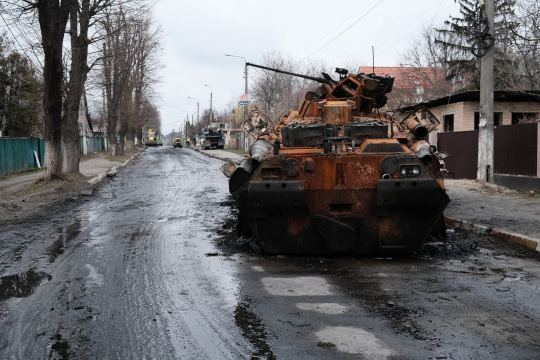
View On WordPress
#Accountability#accountability measures#challenges#contextual factors#cultural context#diverse perspectives#effectiveness assessment#healing#impact on victims#inclusivity#institutional reforms#justice#Limitations#long-term impact#participation#political will#reconciliation#resource constraints#social cohesion#socio-economic context#sustainable peace.#timing#transitional justice#truth#truth and reconciliation processes#truth-seeking#war crimes
0 notes
Text
"Right to Education in India: Challenges, Implementation, and the Way Forward"
Introduction:The right to education is a fundamental human right that ensures every individual has access to quality education without discrimination. In India, the right to education is considered a fundamental right under the Constitution and has been reinforced by legislation such as the Right to Education Act, 2009. This act aims to provide free and compulsory education to all children…

View On WordPress
#access to education#Challenges#constitutional provisions#education system#implementation#inclusive education#India#infrastructure#legal studies#legalstudies#legalstudies.in#quality education#regional disparities#right to education#Right to Education Act#socio-economic barriers#teacher shortages
0 notes
Text
LILITH POSITIONING ACROSS ASTROLOGICAL SIGNS AND HOUSES
LILITH IN ARIES/1ST HOUSE: With a captivating physique, X exudes ambition and competitiveness, yet occasionally appears a bit cheeky. They carry an air of confidence, occasionally perceived as provocative, yet harboring subtle insecurities. Intimidation comes naturally to them, driven by an intense focus on goals. Embracing rebellion, they stand out, and their presence is hard to ignore. X embodies the spirit of someone unafraid to voice opinions, akin to the student who speaks up to the teacher. Their allure extends to a desire for personal transformation, perhaps even considering changes in appearance.
LILITH IN TAURUS/2ND HOUSE: X navigates a world marked by materialism and occasional self-reflection on body image. Issues surrounding food and self-esteem surface, creating a unique journey. Others might envy them for their magnetic charm and allure. Financial boundaries become a grey area, and their choices may not align with traditional moral values. X, with a captivating face and a mesmerizing voice, grapples with a constant hunger for more, never fully satisfied.
LILITH IN GEMINI/3RD HOUSE: Always ahead of the curve, X possesses a way with words that others envy. Sibling dynamics might stir jealousy or comparisons. Sarcasm and clever storytelling are their forte, accompanied by a unique sense of humor. Dark thoughts may cross their mind, and early school experiences shape a somewhat unstable outlook. X sees through people with a sharp tongue, occasionally causing conflicts but showcasing an insightful nature.
LILITH IN CANCER/4TH HOUSE: A nomadic life defines X's experiences, marked by family conflicts and maternal influences. Their journey involves female rivalry, emotional insights, and a quest for a sense of home. X grapples with the complexities of motherhood, either desiring it intensely or feeling the need to avoid it altogether. The influence of a mother figure lingers, leaving traces of rejection.
LILITH IN LEO/5TH HOUSE: X has a taste for unconventional art and may express themselves through creative endeavors. Custody battles and challenges with their own children mark their path. X desires attention, occasionally facing judgment for their self-expression. The stage becomes a platform for rebellion, with a fixation on pleasure and occasional struggles with addictive behaviors.
LILITH IN VIRGO/6TH HOUSE: X approaches life with a critical lens, often seeking recognition for their efforts. Body image becomes a focal point, either through their own scrutiny or the judgment of others. Their service-oriented nature sometimes leads to overcommitment, and they may grapple with extreme views on diet and exercise. The Lilith journey includes experiences with healthcare and a nuanced relationship with hygiene.
LILITH IN LIBRA/7TH HOUSE: X navigates love triangles and occasionally experiences passive-aggressive dynamics. Their charm attracts Lilith-influenced partners, and they may feel incomplete without a significant other. Relationships involve subtle power dynamics, and X might project Lilith qualities onto others. They face challenges such as infidelity and being left for someone else, shaping a complex romantic narrative.
LILITH IN SCORPIO/8TH HOUSE: X exudes power and a touch of mystery. They possess profound psychological insights and occasionally intimidate with their intuition. Privacy is paramount to them, and they may engage in unorthodox behaviors. Fear of exposure lingers, leading to intense reactions from others. X's Lilith journey involves topics like mortality, taxation, and an exploration of intimate relationships.
LILITH IN SAGITTARIUS/9TH HOUSE: X encounters challenges related to religion, education, and socio-economic backgrounds. They may hold strong opinions and rebel against tradition, leading to a sense of being an outcast. X's journey involves a struggle for acceptance and rejection, shaping a unique perspective on cultural dynamics.
LILITH IN CAPRICORN/10TH HOUSE: X becomes a subject of public fascination, carrying an aura of the unconventional. Fear of failure and challenges in professional relationships shape their journey. Lilith dynamics contribute to occasional scrutiny and accusations, adding layers to their professional narrative.
LILITH IN AQUARIUS/11TH HOUSE: X aligns with unique social groups, occasionally facing envy and drama. Friendships involve triangular dynamics and the occasional betrayal. X might avoid conformity and engage in rebellious activities, shaping a distinctive social journey.
#astro notes#astrology#astro observations#astronotes#lilith#lilith conjunct ascendant#lilith 1st house#lilith in the houses#astrology facts#astrology observations#vedic astrology#astro community
1K notes
·
View notes
Note
Since youre antifascist, how about you give us a definition of fascism? What exactly makes someone a fascist? (and in case you use terms such as left-wing or right-wing be sure to define them too)
Guess it's been a while since a clever Anon challenged us to define fascism, huh? Right, let's get into it:
Via the United States Holocaust Memorial Museum:
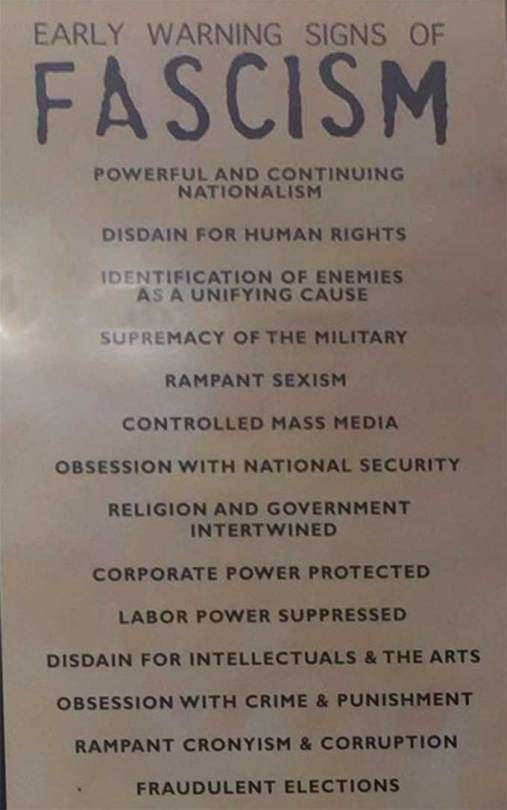
Yale professor Jason Stanley:

“Fascism is a creation of race hatred and its politically organized expression.” - Willhelm Reich, The Mass Psychology of Fascism (1933).
“Fascism is capitalism plus murder.” - Upton Sinclair
“Repression by brute force is always a confession of the inability to make use of the better weapons of the intellect — better because they alone give promise of final success. This is the fundamental error from which Fascism suffers and which will ultimately cause its downfall…that its foreign policy, based as it is on the avowed principle of force in international relations, cannot fail to give rise to an endless series of wars that must destroy all of modern civilization requires no further discussion. To maintain and further raise our present level of economic development, peace among nations must be assured. But they cannot live together in peace if the basic tenet of the ideology by which they are governed is the belief that one’s own nation can secure its place in the community of nations by force alone. ” - Ludwig von Mises, Liberalism: A Socio-Economic Exposition (1927).
“Spent most of the day reading fascisti leaflets. They certainly have turned the whole country into an army. From cradle to grave one is cast in the mould of fascismo and there can be no escape … It is certainly a socialist experiment in that it destroys individuality. It destroys liberty.” - Harold Nicolson, The Harold Nicolson Diaries : 1919-1964 (2004).
“The liberty of a democracy is not safe if the people tolerated the growth of private power to a point where it becomes stronger than the democratic state itself. That in its essence is fascism: ownership of government by an individual, by a group, or any controlling private power.” - Franklin D. Roosevelt
“A fascist is one whose lust for money or power is combined with such an intensity of intolerance toward those of other races, parties, classes, religions, cultures, regions or nations as to make him ruthless in his use of deceit or violence to attain his ends….If we define an American fascist as one who in case of conflict puts money and power ahead of human beings, then there are undoubtedly several million fascists in the United States.” - Henry A. Wallace
“Fascism is the cult of organised murder, invented by the arch-enemies of society. It tends to destroy civilization and revert man to his most barbarous state. Mussolini and Hitler might well be called the devils of an age, for they are playing hell with civilization.” - Marcus Garvey, Authors take Sides on the Spanish War, 1937
Philosophy Tube's breakdown of the elements of fascism is very thorough and recommended if you're not the reading type.
But do you read books? We hope so if you're looking to engage in political discussion about anything. Here are some books that tackle the definition of fascism, in whole or in part, that we would recommend to you (check/order from your local library!)
Mark Bray's highly-accessible Antifa: The Anti-Fascist Handbook is a great starting point for this topic.
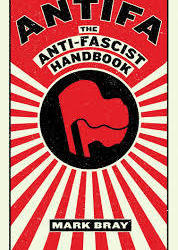
Columbia history professor Robert O. Paxton's excellent book The Anatomy of Fascism goes into this in great detail.
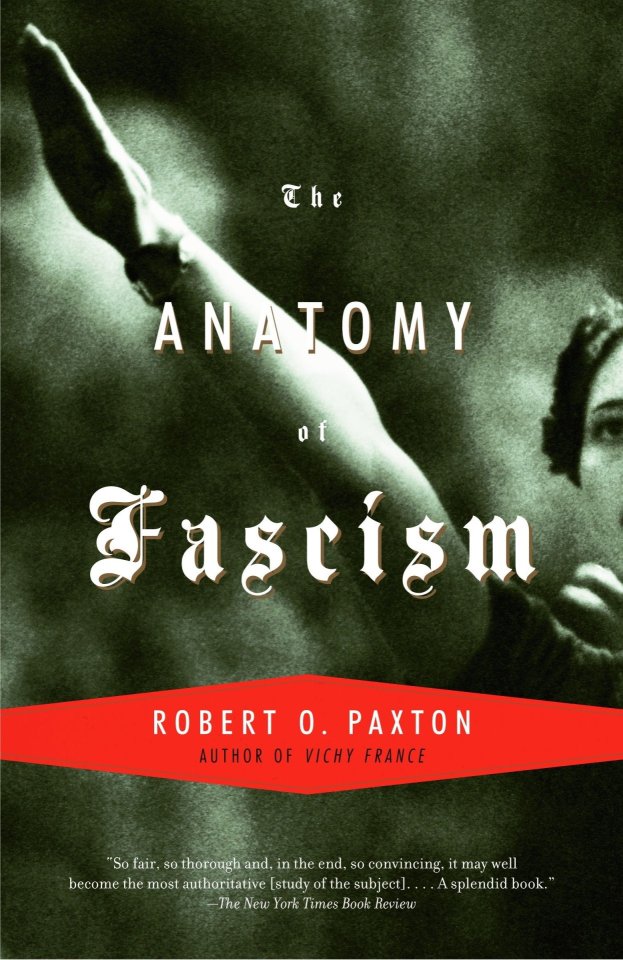
There's also Umberto Eco's The Eternal Fascist

or his "practical list for identifying fascists"
as well as Hannah Arendt's seminal The Origins of Totalitarianism

We hope you weren't looking for a simple answer to the complex question of "what is fascism?" Anon, just as we hope you're up to taking our challenge of checking out all of the above so you're curiosity is satisfied and you're well-versed on the topic.
647 notes
·
View notes
Text
New pre-history-related discovery in Euskadi: evidences of mass warfare in Europe 1,000 years prior to previously thought.

Previous research suggested that conflicts during Neolithic consisted of short raids, lasting no more than a few days and involving small groups of up to 20-30 individuals. As a result, researchers assumed that Neolithic societies lacked the logistical capabilities to support larger-scale conflicts. But the results of the latest study have challenged this view.
To investigate this conflict in the Neolithic, the authors of the latest study re-analyzed remains found at the San Juan Ante Portam Latinam rock shelter (Guardia, Araba), which was discovered accidentally in 1985 when a bulldozer was widening a track and uncovered human remains.
Subsequent rescue excavations identified the remains of at least 338 individuals that have been dated to between roughly 5,400 and 5,000 years ago. These people were buried together in a haphazard way, with the bodies found interwoven with each other—some in unusual positions. The remains were found together with 52 flint arrowheads, 64 blades, two polished stone axes, and other artifacts.
Many of the remains—which include both complete and incomplete skeletons—displayed evidence of arrowhead injuries, while researchers also found a single example of unhealed trauma to the skull, or cranium.
Original interpretations of the mass burial site suggested that the individuals found there were a) buried during a 200 years period or b) slaughtered in a massacre—i.e. the indiscriminate killing of helpless or unresisting people. But subsequent studies have challenged previous interpretations suggesting that many of them died in one or more violent conflicts.
The re-examination of the SJAPL remains in the latest study was aimed at identifying new evidence of violence on the bones: they found that males were disproportionately affected by injuries, while also observing an unusual high rate of healed injuries overall.
The bones provided evidence of re-occurring and varied violent events—for example, some individuals showed both healed and unhealed injuries suggesting repeated exposure to violence, while evidence of arrowhead injuries and cranial traumas indicate that they were involved in different types of combat. The remains also suggest that these people experienced social unrest and difficult life conditions, showing signs of malnourishment, anemia and other conditions.
But what was the conflict?
"We think we are seeing the result of a regional inter-group conflict. We suggest that resource competition and social complexity could have been a source of tension, potentially escalating into lethal violence" said Fernández-Crespo the author of the study affiliated with the University of Valladolid, Spain, Aix-Marseille University, France, and the University of Oxford, U.K
"We can conclude that warfare in the Neolithic was much more sophisticated, organized and with the potential to affect the general population than previously thought, which means that there was necessarily a greater socio-economic hierarchy than previously assumed. The study provides evidence of larger-scale, more organized and longer-lasting conflict than previously suspected for the Neolithic, to an extent that had not been observed until 1,000 years later during the Bronze Age."
[x]
#euskal herria#basque country#pays basque#pais vasco#euskadi#pre history#history#archaeology#anthropology#news#discovery#wow#europe
163 notes
·
View notes
Text
"My analysis challenges a number of ideas, some mentioned above, common in many Western feminist writings:
Gender categories are universal and timeless and have been present in every society at all times. This idea is often expressed in a biblical tone, as if to suggest that 'in the beginning there was
gender.'
Gender is a fundamental organizing principle in all societies and is therefore always salient. In any given society, gender is everywhere.
There is an essential, universal category 'woman' that is characterized by the social uniformity of its members.
The subordination of women is a universal.
The category 'woman' is precultural, fixed in historical time and cultural space in antithesis to another fixed category—'man.'
... Merely by analyzing a particular society with gender constructs, scholars create gender categories. To put this another way: by writing about any society through a gendered perspective, scholars necessarily write gender into that society. Gender, like beauty, is often in the eye of the beholder. The idea that in dealing with gender constructs one necessarily contributes to their creation is apparent in Judith Lorber's claim that 'the prime paradox of gender is that in order to dismantle the institution, you must first make it very visible.' In actuality, the process of making gender visible is also a process of creating gender. Thus, scholarship is implicated in the process of gender-formation."
Oyèrónkẹ́ Oyěwùmí, The Invention of Women: Making an African Sense of Western Gender Discourses (1997)
~
"Feminist anthropologists of racialized peoples in the Americas tend not to think about the concept of gender when they use the term as a classificatory instrument, they take its meaning for granted. This, I claim, is an example of a colonial methodology. Though the claim that gender, the concept, applies universally is not explicitly stated, it is implied. In both group and conference conversations I have heard the claim that 'gender is everywhere,' meaning, technically, that sexual difference is socialized everywhere. The claim, implied or explicit, is that all societies organize dimorphic sexuality, reproductive sexuality, in terms of dichotomous roles that are hierarchically arranged and normatively enforced. That is, gender is the normative social conceptualization of sex, the biological fact of the matter. ... The critique of the binary has not been accompanied by an unveiling of the relation between colonization, race, and gender, nor by an analysis of gender as a colonial introduction of control of the humanity of the colonized, nor by an understanding that gender obscures rather than uncovers the organization of life among the colonized. The critique has favored thinking of more sexes and genders than two, yet it has not abandoned the universality of gender arrangements.
... Understanding the group with gender on one’s mind, one would see gender everywhere, imposing an order of relations uncritically as if coloniality had been completely successful both in erasing other meanings and people had totally assimilated, or as if they had always had the socio-political-economic structure that constitutes and is constituted by what Butler calls the gender norm inscribed in the organization of their relations. Thus, the claim 'There is gender everywhere' is false ... since for a colonized, non-Western people to have their socio-political-economic relations regulated by gender would mean that the conceptual and structural framework of their society fits the conceptual and structural framework of colonial or neocolonial and imperialist societies. ... Why does anyone want to insist on finding gender among all the peoples of our planet? What is good about the concept that we would want to keep it at the center of our 'liberation'?"
María Lugones, "Gender and Universality in Colonial Methodology," in Decolonial Feminism in Abya Yala: Caribbean, Meso, and South American Contributions and Challenges (2022)
71 notes
·
View notes
Text
DAY 5786
Jalsa, Mumbai Dec 19, 2023 Tue 11:44 PM
Birthday - EF Binita Sarkar
Wednesday, 20 December .. family Ef greets the birthday Ef with warmth and love .. ❤️🌹
And so I shred my thoughts of the yester with the gifts of the written word and thought and what I got was a comprehensive essay on what was already expressed within ..
And at the end of it .. life still remains the same ..
"The absence of work can cast a profound shadow on individual lives and societal structures. When opportunities for employment dwindle or vanish, it ripples through communities, affecting not just financial stability but also mental and emotional well-being. At a personal level, the absence of work can erode a sense of purpose, leading to feelings of aimlessness or inadequacy. It can strain relationships, challenge self-worth, and ignite a pervasive sense of uncertainty about the future.
Societally, a lack of employment opportunities can trigger economic downturns, widening socio-economic gaps, and fostering disillusionment. Communities may face reduced productivity, increased dependency on social welfare, and heightened levels of stress due to financial strain. Moreover, the absence of work can amplify social issues, leading to increased crime rates, mental health concerns, and a decline in overall societal morale.
However, amidst this absence, opportunities for growth and innovation may emerge. People might explore new passions, develop alternative skills, or engage in entrepreneurial endeavors. Society might reimagine work structures, fostering flexibility and creativity. The absence of work, while daunting, could provoke a reevaluation of values, leading to a more inclusive and adaptable future."
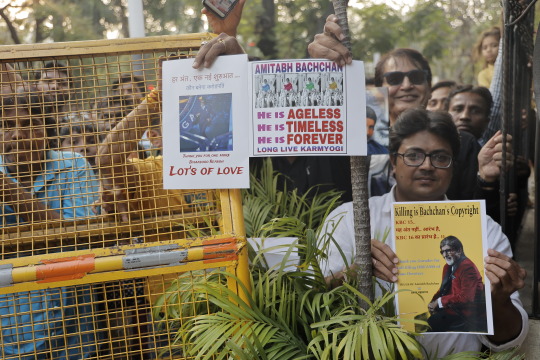
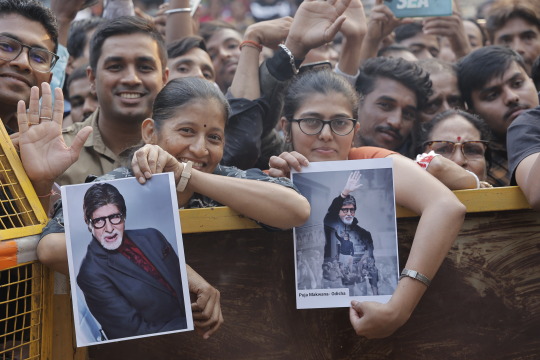
.. they are ecstatic symbols of all that absence of work reflects .. they inspire to continue .. well inspire is a such vagrant word , never conveying its potential in the time and realm of its sounding .. so away with it .. and back to the more mundane ..
LIFE ..
'Life in question of the living belief .. belief , stopping inquiry , presenting doubt , doubt needs science to search the belief .. belief is not knowing the reason for it ..'
or so say the Gurus of wisdom propagation .. questioning the aastik and the nastik .. आस्तिक, और नास्तिक ..
there are millions that believe in belief .. and chosen few that do not .. the righteous and the non righteous .. the right or the wrong .. who be the judge .. life has ever been an unjudged bench of them that design the modes for it ..


the dance of the yellow .. in the blue halo

Amitabh Bachchan
121 notes
·
View notes
Text






Lagos Yellows for COLORS
Writer Ify Obi and photographer Manny Jefferson document the cultural significance of Danfos against the socio-economic challenges threatening their very existence.
#photography#manny jefferson#lagos#mannyjefferson#photographers on tumblr#danfo#public transportation#nigeria#documentary#west africa#ify obi#photojournalism#original photographs#lagos nigeria#colors
50 notes
·
View notes
Text
LIFE-CHANGING ways to UPGRADE/ LEVEL UP your life (and they don't cost money)⬆️
It's often assumed that the road to living the luxe life is paved only with the most potentially bankrupting investments. However, that is not entirely true, dare I say not even mostly true. Many of the investments one has to make in order to improve their quality of life and socio-economic standing require a currency not found in purses, savings accounts or piggy banks. They often require time and effort, and funnily enough, this is where most people fall off. Even in this economy it is easier to throw money 💸 at the problem than it is to dedicating time⏳and consistent effort over the long term, but that has to change if you wish to flourish.
So, here are some financially free, but effort-wise expensive ways to glow up holistically:
Reading - A one-stop shop for improved vocabulary, communication & conversation skills as well as improved imagination.
Journaling - An amazing way to organize and track problems, concerns and fears.
Daily walks - Offer many benefits including improved cardiovascular fitness and increased metabolism.
Decluttering - Provides you with clarity & space for what matters both physically and mentally.
Budgeting - Is the backbone of financial literacy and sound money management.
Meditating - The best first step to becoming more present and reducing unnecessary stress.
Change your attitude - It can better your psychological and physical well-being.
Goal tracking - A tried and true way to keep yourself accountable for your progress
Learn a new skill - To challenge yourself and boost your confidence by encouraging you to become a multilayered person.
Practice good penmanship - An unexpectedly good way to stimulate brain activity and decrease learning obstruction.
In order for any of these tips to work, you have to, first.💯
If you don't go get it, you won't have it💫

#glow up#billionaire#luxury aesthetic#luxury#level up#boss#millionaire#girl boss aesthetic#self love#self care#work in progress#business#girl bosses#luxe life#successmindset#black girl aesthetic#black girl luxury#luxurious#luxuries#high value woman#high quality#best#divine feminine#entrepreneur#ascension#old money#money#new money#confidence#rich aesthetic
119 notes
·
View notes
Text
Monday to Friday | Bradley ‘Rooster’ Bradshaw/F!Reader.
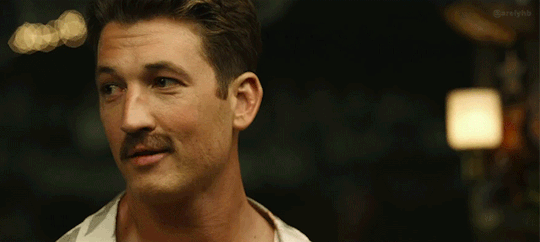
Monday to Friday
Summary: It’s just a crush-- on one of the most beautiful men you’ve ever met in your life. There’s no way he would ever return your feelings right?
2119 words female/AFAB reader. (civilian contract working on base)
,
Warning: None. Some alcohol consumption. (unbeta’d. We’re going in raw here)
Notes: Happy birthday @writercole . I hope you have a wonderful day. As always, likes are welcomed, comments and shares fuel my muses. Thank you so very much for reading, I appreciate it, and it means the most.

Monday.
The first note caught you off guard. A brilliant yellow post-it note stuck to your closed laptop, the writing neat, block letters.
‘Have a good day.’
A cursory glance around proved that you were in fact alone. Chalking it up to the night clerk, you smile, peeling it off and placing it in the top drawer of your desk. The two of you had struck up an easy friendship and occasionally you’d bring her coffee so she could make her drive home, or she’d stay for a few minutes catching you up on gossip and the late-night goings on of the aviators. You boot up the system, and get settled behind your desk, clicking through memos and answering emails.
The building doors open, and you look up, the work smile turning to a genuine smile when three people enter. “Morning.”
You get a sleepy yawn from Lieutenant Garcia, a nod from Machado and an actual response from Lieutenant Fitch. A few others pass through scanning id cards and offering greetings. It wasn’t exactly a challenging job, but it paid well and between emails and making sure identification and person lined up, you could read or otherwise entertain yourself.
“Morning,” a low voice caught your attention. You look up from your book to see one Lieutenant Bradley Bradshaw.
“Hi,” You drop your gaze down to your book, closing it, using a receipt to keep your spot.
He grins, and butterflies explode in your stomach. “Good book?”
“It’s a little slow, but the world building is incredible, He’s created this entire element based magic system that ties in with socio-economic divides which leads to the main conflict between the main characters, and he’s just introduced a character without any sort of magical capabilities at all, which makes her an outcast….” You blink looking up at him. “I’m sorry.”
He's leaning against the high counter, watching you. “Don’t stop.” He’s got a soft smile on his face, his eyes closed listening.
“I’m rambling.” You feel a blush rise on your cheeks. “Plus, you’re going to be late.”
He shakes his head, “I’ve got time.”
“I could loan it to you, I mean if you want to read it.”
“I might take you up on that—”
“Bradshaw! You’re late.” Lieutenant Trace called from down the hall. “Come on, you need to get in here before Mav does.”
His grin is sheepish, and he taps the countertop. “Duty calls.”
Tuesday
“Sorry, sorry I know I’m late. There was a hold up at the gate.” You nearly slip in your haste to get through the front doors, shoes squeaking against the linoleum. Sasha is in your seat behind the desk, looking exhausted, barely holding back yawns.
“I did, however, bring a peace offering.” You place the large to-go cup of tea on the desk. “I overslept and then the mess at the gate…”
“It’s fine.” She takes the cup with a soft laugh. “It’s one of the many perks of being chained to the military.”
“Want me to call you a ride, or are you okay to drive?”
“Will is coming to get me.” She relinquishes the computer chair to you, sitting in the folding chair. “Oh, I don’t know who left this, it was on the desk when I came back from the bathroom.” She passes over a bookmark with a yellow post-it wrapped around it.
You unwrap the post-it and the same block lettering as the day before. ‘Why was the farmer given an award? He was OUTSTANDING in his field.’ You groan and chuckle passing the note off to Sasha. “That was horrible, but in the best way. Good job.” You replace the receipt with the bookmark. “Thanks, by the way.”
She looks confused, shaking her head at the terrible pun. “I didn’t get this for you, I told you it was left.”
“You didn’t leave the note yesterday?”
“Nope,” a little grin appears on her face. “Looks like you’ve got a secret admirer.”
“Don’t be silly.” You put the new note with the first one.
“I bet it’s Lieutenant Floyd, he’s so quiet and shy.” Sasha taps her chin pretending to think. “It could be Lieutenant Bradshaw.” She says coyly. “He likes to talk to you.”
“He’s being polite. He’s a nice guy.”
“Mmhm. A nice guy. Is that why you blush and watch after him as that ass walks down the hallway?”
“Sasha!” You look around making sure no one heard her.
“I’m teasing you.” She pats your shoulder. “I know you’ve got your little crush.”
“Crushes are for children.”
“Infatuation? Source of all your daytime and nighttime fantasies?”
“Oh look, Will’s here.” You point to the door as a tall redhead makes his way through the doors. She laughs softly, patting you on the shoulder.
“I’ll stop. But you should at least ask that fine piece of Navy beef to get coffee.” You watch as the two of them go off hand in hand, Sasha laughing at something her boyfriend said. The rest of your day passed without any sort of issue, the constant flow of people keeping you busy.
“Excuse me?”
You look up from the long-winded email to see a man holding a takeout bag. “I have a delivery for a Bradshaw?”
“Go ahead and leave it here, I’ll make sure he gets it.” You say. The delivery man takes a photo of the bag and turns to go. You pick up the food, heading down the hall, barely avoiding colliding with Lieutenant Bradshaw. “Your lunch is here.”
He takes the bag, opening it and rummaging inside. He frowns and catches your elbow as you turn to leave. “Hey, they doubled it, you want this?” He’s offering a wrapped sandwich.
“Are you sure? I can order something.” In your haste to get out the door you had forgotten to pack a lunch. You stomach growls betraying your words.
“Go on,” He takes your hand, turning it over and placing the sandwich in it. “My treat.”
You skin burns when he touches it, your breath catching in your chest just from the briefest of eye contact. He winks at you, and you’re nearly convinced that you’re going to melt into the floor, or your panties were going to evaporate.
Wednesday
The Hard Deck is packed, despite it being the middle of the week. Classic rock plays over the speakers, chatter and laughter mixed in. You wedge yourself between two sailors, managing to get your order to the bartender. Penny was at the other end of the bar pulling beers, the mugs disappearing as soon as she set them down.
“I’m going to start a tab.” You hand over your card, taking the three bottles of Miller that are passed to you. He nods, turning to take the orders of other patrons. You make your way back to the corner table you and a couple friends managed to secure.
Conversation and jokes fly, the three of you catching up for the first time in months. Work was busy for the other two and eventually the conversation turned to you.
“Have you talked to him yet?” Marcy asked, taking a sip of her beer.
“Who?”
“That gorgeous man with the ugly moustache.” She pointed toward Bradley who was by the pool table with the other aviators.
“I see him at work.” You shake your head. “And he’s definitely not interested.”
“Not interested, but he’s looking over here.”
“The bar is packed Marcy; he could be looking at anyone.”
The jukebox cuts off, the groan of the patrons almost instant. You lose sight of Bradley for a moment, but the sound of piano keys jingling draws your attention that way. He’s on the bench, rolling his shoulders, fingers plucking out a few notes to get attention. He starts to play, the bar singing along with him. The way he commands the bar is breathtaking, magnetic, bringing everyone together. He’s lost to the music, howling the words to the song. Sweat beads his brow, and the neon lights of the bar make him glow. He’s breathtaking and you can’t help but watch him, enamored with his presence.
“You should wipe your mouth.” Marcy hands you a napkin. “You’ve got a bit of drool…”
“Shut up.” You mutter, snatching away the offering.
“Go sing with him.”
“You know damn well I can’t carry a tune, even if you hand it to me in a bucket.”
“So, send him a beer.”
Now, that was an idea you could get behind. You get up, headed for the bar. The bartender who served you previously grins making his way over. “Can you send a beer to Rooster?” His call sign felt wrong, almost intimate coming from your mouth. “Put it on my tab, and I’m going to close out.”
“You want me to let him know who it’s from honey?”
“No, no just someone who appreciates the music.”
Thursday.
“Mornin’ sweetheart.” A travel cup appears in your line of sight. “Rough night?” The familiar voice slides down your back like velvet. You look up to see Lieutenant Bradshaw holding a cup of his own. “Didn’t know how you like it, so I just got you a mocha.”
“We started with beer and switched to vodka later in the evening.” You murmur. The headache behind your eyes had started to subside. The coffee smelled good.
“I thought I saw you last night.” He’s leaning against the counter, watching you with a small smile. “You should have come say hi.”
“You were hustling Lieutenant Seresin at the pool table. I didn’t want to interrupt you.”
He chuckles. “I probably would have done better. Pretty women always bring luck.”
You nearly choke on your sip of coffee. It’s sweet, warm and what you wanted. You didn’t realize how much you wanted those words to come out of his mouth. “You think I’m pretty?”
“I don’t think it, I know it.” He taps the countertop. “You have a good morning alright?”
You watch as he walks away, wrapping your hands tight around the cup.
He pauses before he enters the briefing room, he pauses, says your name. “Thanks for the beer.”
Friday.
You shut down your computer, logging out for the evening. Eyeing the clock, you see that you still have a little while before Sasha comes in to relieve you. Reaching for a pile of print outs you start going over the names and completing the last of your paperwork before you can enjoy your evening.
“You look nice.” Sasha says, coming around the desk to join you. “Hot date?”
You roll your eyes, “Only with Netflix and a pizza. Maybe a glass of wine.”
“Does he know the plans for the evening?”
You follow her gaze to see Bradley sitting on one of the benches near the door, just out of earshot. “He left a while ago, what’s he doing back?”
“I think he has plans to invite you to dinner or drinks. Based on what he was saying when he was on the phone.”
“You think so?” You tug at the hem of your shirt. “Do I really look okay?”
“You look amazing. Anyway, you could be wearing a trash bag and he’d be looking at you with those big brown eyes as if you handed him the stars.” She hands over your purse. “Go, have fun.”
The hallway seems impossibly long when you leave your workspace. He looks up when you stop in front of him. “I ah, wanted to give you this before, but I thought I missed you.” You pull the book from your bag, offering it to him. “I’m keeping the bookmark, but I left you something to keep your spot.” The receipt poked out between the pages; your number written on the top of it.
He takes the book, “You wanna grab a drink?” He clears his throat, “tonight, with me. We can talk about the book.”
“You’ve read just by holding it?”
Bradley drops his gaze, a blush rising on his neck. It’s cute, especially when it travels to his ears. “I’ve read it already. It’s one of my favorites.”
“The notes?”
“I like your smile.” He chuckles, “the beer?”
“I like your singing.”
“You’d also like him out of that ugly ass Hawaiian shirt. Quit flirting in front of my salad and go!” Sasha’s voice carries down the hallway.
Bradley gets to his feet and offers you, his hand. “Let’s go before she accuses us of watching her salad dressing.”
“That was horrible.” You mutter groaning. “Absolutely terrible.”
“I am terrible, but I’m also very good. I’d like to show you how good.” He’s leaning down, murmuring into your ear. “But first, let me buy you dinner.”
----------------------
tagging in: @princessmisery666 @princessphilly @evansrogerskitten @hoe-on-the-range @callsign-phoenix @callsign-fox @mayhem24-7forever @shadeds-library @butaneandthebeast @blue-aconite @therebeccaw @marvelandotherfandomimagines @jostystyles @cowboybarbie @mandylove1000 @topguncortez @hederasgarden
#Bradley 'Rooster' Bradshaw/reader#Bradley 'Rooster' Bradshaw/you#Bradley 'Rooster' Bradshaw x reader#Bradley 'Rooster' Bradshaw x you#Bradley 'Rooster' Bradshaw#Rooster/you#Rooster/Reader#shelly writes#reader insert#reader imagine#Top Gun Maverick#Top Gun: Maverick
531 notes
·
View notes
Text
COVID-19 Pandemic: Unraveling the Global Learning Crisis
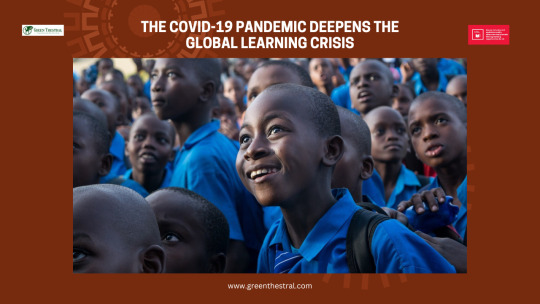
The COVID-19 pandemic has left an indelible mark on the world, disrupting economies, healthcare systems, and everyday life. One of the most significant areas affected by this unprecedented global crisis is education. With schools closing their doors to prevent the spread of the virus, the world has witnessed the deepening of a global learning crisis. The pandemic's impact on education has been profound, exacerbating existing inequalities and creating new challenges for learners, educators, and policymakers worldwide. In this article, we will delve into the ways the COVID-19 pandemic has intensified the global learning crisis and explore potential strategies to address these pressing issues.
The Disruption of Education During the Pandemic
When the World Health Organization (WHO) declared COVID-19 a pandemic in early 2020, governments worldwide swiftly implemented strict measures to curb the virus's spread. One of the most crucial measures was the closure of educational institutions. Overnight, classrooms turned into virtual learning environments, and educators had to adapt rapidly to online teaching methods.
While some countries were better equipped to transition to online education, others faced significant challenges due to a lack of infrastructure and access to technology. The digital divide became more pronounced as students from low-income families or remote regions struggled to keep up with their studies. As a result, millions of children and young adults were left without access to education, further exacerbating the global learning crisis.
Widening Educational Inequalities
The pandemic has widened existing educational inequalities worldwide. Students from privileged backgrounds with access to reliable internet connections, laptops, and private tutors were better equipped to continue their education remotely. On the other hand, students from marginalized communities often lacked the necessary resources to participate in online learning effectively.
Furthermore, learners with disabilities faced additional barriers, as many online platforms were not designed to accommodate their specific needs. This disparity in access to quality education has the potential to have far-reaching consequences, as it perpetuates social and economic inequalities for generations to come.
Learning Loss and the Educational Gap
Extended school closures and disrupted learning routines have resulted in significant learning loss for many students. Studies have shown that prolonged absences from the traditional classroom setting can lead to a decline in academic performance and cognitive development.
Moreover, the pandemic has created an educational gap between different age groups. Early childhood education, a critical developmental phase, has been severely impacted, potentially affecting children's long-term cognitive and social-emotional development. Similarly, older students faced the stress of delayed examinations, college admissions, and uncertainty about their future prospects.
Mental Health Impact on Students and Educators
The pandemic's toll on mental health has been considerable, impacting both students and educators. The abrupt shift to remote learning and the uncertainties surrounding the pandemic have caused stress, anxiety, and feelings of isolation among students. Many have struggled to cope with the challenges of online learning and the absence of social interactions with peers.
Educators, too, have faced unprecedented pressures, adapting to new teaching methods, dealing with technological challenges, and juggling personal responsibilities amidst the pandemic. The resulting burnout and fatigue among teachers have affected the overall quality of education and student support.
Solutions to Mitigate the Global Learning Crisis
While the COVID-19 pandemic has undoubtedly exacerbated the global learning crisis, there are several strategies that policymakers, educators, and communities can adopt to address these challenges and build a more resilient education system:
1. Bridging the Digital Divide
Governments and educational institutions must prioritize bridging the digital divide to ensure all students have equal access to quality education. This can be achieved through initiatives that provide laptops, tablets, or internet connectivity to students from disadvantaged backgrounds. Additionally, investing in the development of educational content optimized for low-tech devices can increase accessibility for students with limited resources.
2. Blended Learning Approaches
Blended learning, a combination of online and in-person instruction, can offer a flexible and inclusive approach to education. This approach allows for personalized learning experiences while maintaining the benefits of face-to-face interactions with teachers and peers. By incorporating digital tools and resources into the curriculum, educators can cater to diverse learning styles and individual needs.
3. Teacher Training and Professional Development
Empowering teachers with the necessary skills and tools to adapt to changing circumstances is crucial. Comprehensive training in online teaching methodologies and the use of technology in education can enhance the quality of remote learning. Moreover, providing ongoing professional development opportunities can help teachers stay motivated and engaged, ultimately benefiting their students' learning outcomes.
4. Prioritizing Early Childhood Education
Recognizing the significance of early childhood education, governments should prioritize resources for early learning programs. Investing in early childhood education can have a profound impact on children's cognitive and social development, setting them on a path to success in later years.
5. Strengthening Support Systems
To address the mental health challenges faced by students and educators, it is essential to establish robust support systems within educational institutions. Counseling services, peer support groups, and mental health awareness programs can create a nurturing and empathetic learning environment.
Conclusion
The COVID-19 pandemic has indeed deepened a global learning crisis, affecting millions of learners around the world. The disruption of education, widening educational inequalities, learning loss, and the mental health impact on students and educators have posed significant challenges to the education sector.
However, by implementing innovative strategies such as bridging the digital divide, adopting blended learning approaches, prioritizing teacher training, investing in early childhood education, and strengthening support systems, we can begin to mitigate the adverse effects of the pandemic on education.
As we navigate the path to recovery, it is vital for governments, educators, parents, and communities to come together and work collaboratively towards building a more resilient and inclusive education system that can withstand future challenges. Only through collective efforts can we ensure that every child has access to a quality education, regardless of the circumstances they may face. Let us seize this opportunity to reshape education for a brighter and more equitable future.
What's In It For Me? (WIIFM)
In this blog article on the COVID-19 pandemic's impact on education, you will gain a comprehensive understanding of how the global learning crisis has deepened in the wake of this unprecedented health crisis. Discover the challenges faced by students, educators, and policymakers, and explore effective strategies to address these issues. Learn about the widening educational inequalities, learning loss, and the mental health impact on learners and teachers. Moreover, find practical solutions and actionable steps to contribute to building a more resilient and inclusive education system for a brighter future.
Call to Action (CTA)
Join us in addressing the global learning crisis deepened by the COVID-19 pandemic. Share this article with your friends, family, and colleagues to spread awareness about the challenges faced by learners and educators worldwide. Engage in discussions about the importance of equitable access to quality education and the need for innovative solutions. Support initiatives that bridge the digital divide, prioritize early childhood education, and promote teacher training and professional development. Together, let's work towards building a stronger and more sustainable education system that can withstand future challenges.
Blog Excerpt
The COVID-19 pandemic has had a profound impact on education globally, deepening a pre-existing learning crisis. With schools closing their doors to curb the virus's spread, millions of students were left without access to education, exacerbating existing educational inequalities. This blog article delves into the far-reaching consequences of the pandemic on learners, educators, and communities. Discover how the sudden shift to remote learning widened the educational gap and led to learning loss among students. Uncover the mental health challenges faced by learners and teachers during these uncertain times. But, more importantly, explore actionable solutions to mitigate the global learning crisis and build a more resilient and inclusive education system.
Meta Description (320 characters)
Discover how the COVID-19 pandemic has deepened the global learning crisis. Explore its impact on education, widening inequalities, learning loss, and mental health challenges. Learn actionable strategies to address these issues and build a more resilient education system. Join us in shaping a brighter future.
#COVID-19 pandemic and education crisis#Impact of COVID-19 on global education#Challenges in remote learning during pandemic#Educational inequalities deepened by COVID-19#Learning loss due to school closures#Mental health impact on students and teachers#Solutions for the global learning crisis#Bridging the digital divide in education#Blended learning during COVID-19#Teacher training for online education#Early childhood education importance#Coping with remote learning challenges#Supporting students' mental health#Inclusive education post-pandemic#Rethinking education post-COVID-19#Resilient education systems for the future#Equity in online learning resources#Adapting curriculum for remote education#Parental involvement in virtual learning#Online education and socio-economic disparities#Government policies for education post-pandemic#Building community support for learners#Impact of the pandemic on higher education#Addressing the digital divide in rural areas#The role of technology in pandemic education#Redefining the role of educators during COVID-19#Promoting student engagement in virtual classrooms#Innovations in teaching methods post-pandemic#Fostering creativity and critical thinking in online education#Collaborative learning in a virtual environment
0 notes
Text
Listen, I love all the deep, thoughtful explorations of the challenges Steve and Eddie might face in a relationship because of their vastly different backgrounds and socio-economic statuses, but I honestly think their biggest challenge after they move in together would stem from Steve being a "sees the gas needle dip below 1/2 a tank...oops better fill up" person and Eddie being a "needle has been hovering below the E for two days...I know my car" person.
308 notes
·
View notes
Note
Days late but i'm reading the Q&A and i cannot tell if this guy is just Taking The Piss it slowly going mad from adapting it or if he's actually semi-incompetent
I saw a post about it and lots of people were. super mad abt it especially since the adaptation made so many changes. i have no strong thoughts but i also do not think generally so I Have No Input. ultimately i don't even know how much creative control he has, or what "the original author approved of the changes" means.
i genuinely. from the q&a cannot tell if he is trying to take the piss or just does not know how to read. i'm trying to be neutral because I Know Nothing. but this is more like the political side of webcomic discussions and you're probably more the socio-economic side so
oh don't worry nonnie! i have plenty of strong thoughts about it for the both of us :))
i hesitate a lot to criticize anyone's artwork because i know how hard art can be. and i personally have no real experience adapting from one medium to another so i'm even more apprehensive of speaking about something i know very little of.
but oh boy did the q&a dash away all of my reservations.
forgive me for taking your ask as an excuse to rant about it but i wanna thoroughly dissect it (derogatory)
i cannot tell if this guy is just Taking The Piss it slowly going mad from adapting it or if he's actually semi-incompetent
i don't think he's taking the piss. i think he's being completely earnest about thinking he's doing a good job at adapting tged. i think he genuinely thinks he's cracked the code on how to make a good adaptation.
i think he's completely wrong
here's what i mean. this is his answer when asked what's the most important part to keep in mind when adapting something:

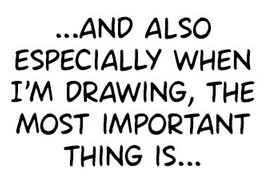


now, this doesn't sound bad at first. i'll give him that, at first glance, this looks like pretty decent advice. when making something, especially a work of fiction, it's pretty tempting to guide yourself by a 'what will the audience like?' mentality. and it's not a bad thing to want your content to be engaging, that's half of the challenge of making anything made to consumed.
but to consider it the most important part of the creative process?? to create or adapt a story based on what it's 'entertaining' instead of what you're trying to convey to your audience??
especially when this is what you think is what you should be focusing on


like. sir. is that really what you're worrying about. really.
that last panel is especially infuriating to me because. why does he care so much about making the episodes funny. why is that his most pressing concern. there are so many things that are way more important than the comedy, like character development, relationship building, plot foreshadowing, a million other things and instead he just. cares about whether the latest episode was funny or not.
tged is a fun novel, it has so many funny moments but if asked i would not say it was a comedy. and it certainly never seemed to make an effort to make sure all of its chapters were funny.
so why on god's green earth does he seem to believe the adaptation needs to be over all other things funny.
why was that the direction he decided to take.
and i for one i'm almost absolutely certain it was his decision to go that route.
especially because this was his answer at being asked if he felt any pressure regarding the characters or plot development.

nunca quise madrear a alguien mas que a este pinche monillo
he does go on to say all the changes were approved by bk moon but like. god what a way to confirm that he didn't a single shit about the characters and plot beyond making something he personally found funny lmaooo
and then this!! this!!

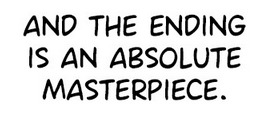

the way he's admitting that he's changing whatever he feels like because as long as he 'doesn't stray too far from the central storyline' it doesn't matter,,,, because he already knows the ending and so as long as he can check off some boxes regarding the plot it doesn't really matter what happens in between,,, i wanna wring his neck so bad,,,
i already ranted about it in the tags before but you can't take a story and assume that as long as you get from point A to point B the parts in between don't matter. that's not how it works.
the ending of a story is the culmination of all the emotional and narrative build up you've done through the entire length of your work. is all the character moments, relationship growth and plot development that you've carefully sown in your story coming together to finally deliver what you've build up.
yes, the ending is an absolute masterpiece. because it has en entire novel of build up before it. because it took its time to make the audience engage earnestly with its characters and its plot. because it didn't make fun of itself at every moment possible and instead took itself seriously when the narrative called for it.
because the novel was telling a story and it wanted us to be invested on it beyond a superficial 'haha funny man makes ugly faces' reaction.
and because lee hyunmin is too busy wondering if every chapter is as funny as possible he's not doing the work needed to make sure the ending delivers the absolute gut punch and emotional catharsis it does on the novel.
he thinks he can just fuck around his way through the plot and still reap the same rewards bk moon did with the novel.
and if he keeps going like this he's not gonna be able to.
but that's just my opinion of course <3
#hey i got an ask#Anonymous#tged#the greatest estate developer#again. i am so sorry i took your ask to rant about this nonnie akjshdkja#i'm also curious about what you mean by your ask being more about the political side of the webcomic#and me being more about the socio-economic side of it. it sounds fascinating!! i wanna know more 👀
33 notes
·
View notes